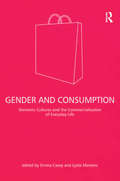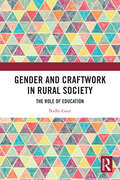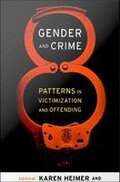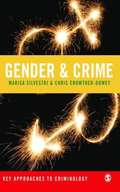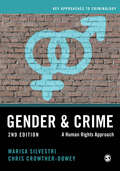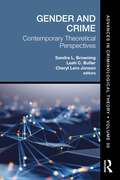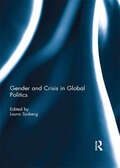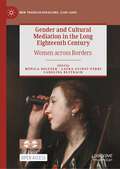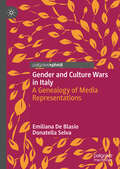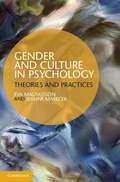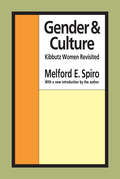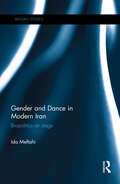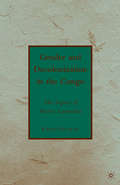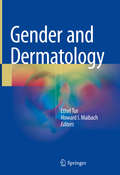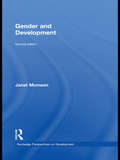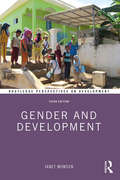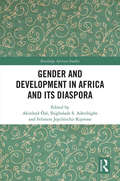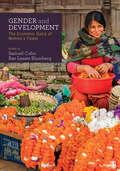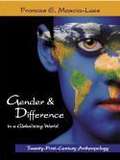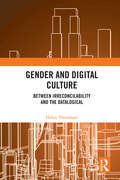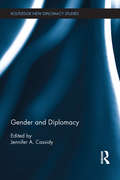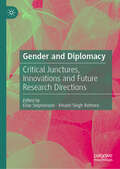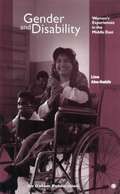- Table View
- List View
Gender and Consumption: Domestic Cultures and the Commercialisation of Everyday Life
by Lydia Martens Emma CaseyDrawing upon anthropological, sociological and historical perspectives, this volume provides a unique insight into women’s domestic consumption. The contributors argue that domestic consumption represents an important lens through which to examine the everyday production and reproduction of socio-economic relations. Through a variety of case studies (such as gambling, wedding day consumption and bedroom décor), the essays explore and reconsider the nature of public and private spaces, and the subsequent nature of domestic space - often by challenging traditional notions of what constitutes ’the domestic’. The volume demonstrates the broad range of experiences that domestic consumption offers women and reveals some of the complex meanings and motivations underpinning women’s consumption practices.
Gender and Craftwork in Rural Society: The Role of Education
by Nidhi GaurThis book examines the potential of craft-centred education to influence the gender socialisation of rural children through a philosophical, sociological, and psychological lens. It discusses Gandhi’s vision of craft-centred education and situates its place within his concept of ‘swaraj.’ The volume looks at the construction of gender at home, students’ participation in crafts at school, and parental perception of craft-centred education. It studies the students’ experience, its impact on their intellectual and physical development, and the nature of the interaction between the socialisation of children at home and in school.An important contribution to the study of Gandhian practices, the book will be of considerable interest to students and researchers of gender studies, education, non-violence, peace studies, and South Asian studies.
Gender and Crime
by Candace Kruttschnitt Karen HeimerWhile rates of violent victimization have declined, women are still much more likely than men to be attacked by an intimate partner. Simultaneously, women’s involvement in the criminal justice system, as arrestees and sentenced offenders, is increasing. Criminologists are struggling to understand these patterns of offending and victimization and how they can be prevented. Composed of original contributions by many of the top scholars in criminology, these essays will help to transform our understanding of women's relation to crime. Composed of original contributions by many of the top scholars in criminology, these essays will help to transform our understanding of women’s relation to crime. Contributors: Jennifer L. Castro, Stephen A. Cernkovich, Sarah Curtis-Fawley, Kathleen Daly, Laura Dugan, Jill A. Dienes, Rosemary Gartner, Carole Gibbs, Peggy C. Giordano, Karen Heimer, Gwen Hunnicutt, Candace Kruttschnitt, Gary LaFree, Janet L. Lauritsen, Ross Macmillan, Bill McCarthy, Jody Miller, Christopher W. Mullins, Callie Marie Rennison, Nancy Rodriguez, Sally S. Simpson, Hilary Smith, Stacy Wittrock, Halime Ünal, and Marjorie S. Zatz.
Gender and Crime
by Dr Chris Crowther-Dowey Marisa SilvestriThis text provides a much-needed, comprehensive critical introduction to debates about the relationship between gender and crime. Bringing together both feminist and masculinist perspectives, the book is a 'one stop shop' for gaining knowledge and understanding of the field of gender and crime as a whole. In addition to offering an overview of key themes and issues, Silvestri and Crowther-Dowey breathe new life into existing and well-rehearsed debates by considering the usefulness of drawing on a human rights discourse for making sense of gender, crime and criminal justice. In re-thinking the experiences of women and men as offenders, victims and criminal justice professionals within a human rights framework, the authors encourage a fresh approach to traditional debates about gender and crime. The book integrates empirical, theoretical and policy-related materials in order to encourage a thorough understanding of the field. Complex ideas and debates are grounded with reference to real life examples. The learning process is supported through the use of chapter overviews, key terms, study questions and suggestions for further reading. Gender and Crime is essential reading for students and academics in criminology, sociology, social policy and gender studies. The Key Approaches to Criminology series celebrates the removal of traditional barriers between disciplines and, specifically, reflects criminology's interdisciplinary nature and focus. It brings together some of the leading scholars working at the intersections of criminology and related subjects. Each book in the series helps readers to make intellectual connections between criminology and other discourses, and to understand the importance of studying crime and criminal justice within the context of broader debates. The series is intended to have appeal across the entire range of undergraduate and postgraduate studies and beyond, comprising books which offer introductions to the fields as well as advancing ideas and knowledge in their subject areas.
Gender and Crime: A Human Rights Approach (Key Approaches to Criminology)
by Marisa Silvestri Chris Crowther-DoweyThis book is a comprehensive and critical introduction to the field of gender and crime, re-thinking the key themes and debates within a human rights framework. Integrating empirical, theoretical and policy-related material, this Second Edition has been significantly updated, and now includes; Full consideration of the 2010-2015 Coalition Government and its effect on gender and crime within England and Wales A new chapter relating criminological theory to gender and crime A new chapter discussing the history of gender and crime A new chapter analysing contemporary issues in gender and crime in a globalised world Fully updated learning features including; Chapter Overviews, Key Words, Study Questions, Chapter Summaries, Key Further Readings and a Glossary. Gender and Crime: A Human Rights Approach is essential reading for students studying criminology, sociology, social policy and gender studies.
Gender and Crime: A Human Rights Approach (Key Approaches to Criminology)
by Marisa Silvestri Chris Crowther-DoweyThis book is a comprehensive and critical introduction to the field of gender and crime, re-thinking the key themes and debates within a human rights framework. Integrating empirical, theoretical and policy-related material, this Second Edition has been significantly updated, and now includes; Full consideration of the 2010-2015 Coalition Government and its effect on gender and crime within England and Wales A new chapter relating criminological theory to gender and crime A new chapter discussing the history of gender and crime A new chapter analysing contemporary issues in gender and crime in a globalised world Fully updated learning features including; Chapter Overviews, Key Words, Study Questions, Chapter Summaries, Key Further Readings and a Glossary. Gender and Crime: A Human Rights Approach is essential reading for students studying criminology, sociology, social policy and gender studies.
Gender and Crime: Contemporary Theoretical Perspectives (Advances in Criminological Theory)
by Cheryl Lero Jonson Sandra L. Browning Leah C. ButlerThis volume takes stock of contemporary perspectives on gender and crime. In 1975, Freda Adler published her pathbreaking book, Sisters in Crime: The Rise of the New Female Criminal. She made the bold claim that changes in American society—including changing attitudes and opportunities—would allow for greater participation of women in criminal enterprises.Beyond her substantive thesis, which turned out to be partially accurate, Adler opened up a vibrant new area within criminology: the study of gender and crime. Now nearly a half‑century later, the field of criminology is replete with women scholars who are making plentiful and important contributions. As a result, this volume explores cutting‑edge issues. Part I starts by laying out a theoretical foundation, focusing on the origins of theories of female criminality, and then providing an overview of more contemporary perspectives. Part II explores the role of race in shaping women’s criminality, drawing on the novel approaches of “Black Criminology” and the study of intersectionality. Part III gives attention to issues that heretofore were male‑centric, illuminating female desistance from crime, the effects of peer groups, and gender differences in attitudes toward criminal justice policies. Finally, Part IV considers the explanation of three important realms of criminality—risky lifestyles, white‑collar crime, and terrorism.This volume will be of interest to a wide range of criminologists and is an ideal choice for use in graduate seminars and upper‑level undergraduate courses.
Gender and Crisis in Global Politics
by Laura SjobergThe global political arena is (again) in a time of crisis. Different sources pay attention to different crises: the Global Financial Crisis, the Debt Crisis, the Crisis of ISIL/Daesh in Iraq and Syria, the Crisis of Israel and Palestine, and the Iran Nuclear Crisis have gotten significant attention in media coverage of global politics. But those are not the only crises that scholars and practitioners discuss. Environmentalists warn of ecological crisis, health scholars warn of disease crises, cyber-security experts suggest a coming information crisis, and migration experts warn of population crises. Feminist work on global politics has addressed many of these crises - historical and contemporary - in crisis language and without it, as well as a number of the non-crises that looking for women and gender in the international arena draws into focus. That work, however, had generally not explicitly theorized the conceptualization of crisis, its gendered dimensions, and/or gender-based crises as such. Across this book, feminist conversations about crisis in global politics suggests that a single feminist approach to, definition of, or politics of crisis is impossible to find. That same variety of work, though, makes a strong case that paying attention to crises in the world and to the manufacture of crisis rhetoric alongside events in global politics is not only generally important but an important place for feminist scholarship, feminist political activism, and direct attention. This book was previously published as a special issue of the International Feminist Journal of Politics.
Gender and Cultural Mediation in the Long Eighteenth Century: Women across Borders (New Transculturalisms, 1400–1800)
by Mónica Bolufer Laura Guinot-Ferri Carolina BlutrachThis open access book explores the transnational and transoceanic dimensions of the debate on gender and women's cultural agency and mediation in the long eighteenth century. It aims to decenter perspectives on traditional Enlightenment geographies, by emphasizing cultural transfers between Southern Europe and the rest of Europe, as well as with the Americas; by focusing on a variety of cultural mediators—women authors, female (and male) translators, readers, travelers, and disseminators; and by examining diverse written and visual sources—from correspondence, travel narratives, and philosophical essays, to novels, opera, portraits.
Gender and Culture Wars in Italy: A Genealogy of Media Representations
by Donatella Selva Emiliana De BlasioThis book examines contemporary culture wars around gender in Italy. Applying methods from European cultural studies, the authors reconstruct the ways in which gender issues have become part of the contemporary culture wars in Italy. Recently the convergence between neoliberalism and populism has emphasised the centrality of gender in the political arena at the global level, as well as its crucial place in the rise of far-right and alt-right formations. By examining the cases of three key debates from the last five years, this book traces the moments, actors, and argumentative strategies that triggered these culture wars around gender issues.
Gender and Culture in Psychology
by Jeanne Marecek Eva MagnussonGender and Culture in Psychology introduces new approaches to the psychological study of gender that bring together feminist psychology, socio-cultural psychology, discursive psychology and critical psychology. It presents research and theory that embed human action in social, cultural and interpersonal contexts. The book provides conceptual tools for thinking about gender, social categorization, human meaning-making, and culture. It also describes a family of interpretative research methods that focus on rich talk and everyday life. It provides a close-in view of how interpretative research proceeds. The latter part of the book showcases innovative projects that investigate topics of concern to feminist scholars and activists: young teens' encounters with heterosexual norms; women and men negotiating household duties and childcare; sexual coercion and violence in heterosexual encounters; the cultural politics of women's weight and eating concerns; psychiatric labelling of psychological suffering; and feminism in psychotherapy.
Gender and Culture: Kibbutz Women Revisited
by Melford E. SpiroBased on a study of the Israeli kibbutz movement, Gender and Culture discusses the differences in male and female orientations to marriage, the family, and work. Spiro describes the counterrevolution in the kibbutz movement as it evolved over a quarter century period. The kibbutz Spiro first studied, Kiryat Yedidim, was thirty years old at the time, and he returned there twenty-five years later. Spiro initially found that the pioneers of the kibbutz movement, in their attempt to implement their vision of a society based on sexual equality, had created a revolution in the character of marriage, the structure of the family, patterns of child rearing, and the sexual division of labor.The counterrevolution he found twenty-five years later was no less fascinating: a return to certain important features of the prerevolutionary forms of these social institutions. This return to tradition has been the work primarily of the young women who, born and raised in the kibbutz, had been inculcated with the revolutionary ideology of the kibbutz pioneers. Studying the same community after a twenty-five-year interval enables readers to observe the children of the first study as adults in the follow-up study. This longitudinal dimension provides the most important basis for the interpretations offered in Gender and Culture. A new introduction discusses additional, even more radical changes that have occurred since the book's original publication in 1979, situating the kibbutz experience in the context of contemporary gender studies and feminist thought. The book will be of continuing importance for sociologists, anthropologists, psychologists, and women's studies scholars.
Gender and Dance in Modern Iran: Biopolitics on stage (Iranian Studies)
by Ida MeftahiGender and Dance in Modern Iran: Biopolitics on Stage investigates the ways dancing bodies have been providing evidence for competing representations of modernity, urbanism, and religiosity across the twentieth century. Focusing on the transformation of the staged dancing body, its space of performance, and spectatorial cultural ideology, this book traces the dancing body in multiple milieus of performance, including the Pahlavi era’s national artistic scene and the popular café and cabaret stages, as well as the commercial cinematic screen and the post-revolutionary Islamized theatrical stage. It links the socio-political discourses on performance with the staged public dancer, in order to interrogate the formation of dominant categories of "modern," "high," and "artistic," and the subsequent "othering" of cultural realms that were discursively peripheralized from the "national" stage. Through the study of archival and ethnographic research as well as a diverse literature pertaining to music, theater, cinema, and popular culture, it combines a close reading of primary sources such as official documents, press materials, and program notes with visual analysis of filmic materials and imageries, as well as interviews with practitioners. It offers an original and informed exploration into the ways performing bodies and their public have been associated with binary notions of vice and virtue, morality and immorality, commitment and degeneration, chastity and eroticism, and veiled-ness and nakedness. Engaging with a range of methodological and historiographical methods, including postcolonial, performance, and feminist studies, this book is a valuable resource for students and scholars of Middle East history and Iranian studies, as well as gender studies and dance and performance studies.
Gender and Decolonization in the Congo
by Karen BouwerGender and Decolonization in the Congo focuses on women and questions of gender in its examination of Patrice Lumumba (1925-1961), the assassinated leader of the independent Congo.
Gender and Dermatology
by Howard I. Maibach Ethel TurThis book comprehensively reviews the characteristics of the body reflected in the skin due to differences in gender. It investigates the genetic and hormonal differences that can affect skin structure and function, and resulting in variations between women and men. The aging process and exogenous factors that differ according to differences in lifestyle between the sexes are also covered. Gender and Dermatology comprehensively outlines the various aspects of physiological differences between the skin of women and men using practical examples and review of the basic science. It is therefore an important clinically-relevant review for both the trainee and experienced practitioner in dermatology, primary care, geriatrics and immunology, while also being of interest to researchers in genetics and metabolic medicine.
Gender and Development (Routledge Perspectives on Development)
by Janet MomsenGlobal financial problems, rising food prices, climate change, international migration - increasingly by women - conflict situations in many poor countries, the spread of tropical diseases such as malaria and dengue fever and the increased incidence of HIV/AIDS and TB, and changing patterns of trade have all added new dimensions to gender issues in developing countries. These problems are frequently being brought to public attention in the media and through long-haul tourism. Consequently students' interest in gender and development has grown considerably in the last few years. This updated second edition provides a concise, accessible introduction to Gender and Development issues in the developing world and in the transition countries of Eastern and Central Europe. The nine chapters include discussions on changes in theoretical approaches, gender complexities and the Millennium Development Goals; social and biological reproduction including differing attitudes to family planning by states and variation in education and access to housing; differences in health and violence at major life stages for women and men and natural disasters and gender roles in rural and urban areas. The penultimate chapter considers the impact of broad economic changes such as the globalization of trade and communications on gender differences in economic activity and the final chapter addresses international progress towards gender equality as measured by the global gender gap. The text is particularly strong on environmental aspects and the new edition builds on this to consider the effects of climate change and declining natural resources illustrated by a case study of changing gender roles in fishing in India. There is also enhanced coverage of topics such as global trade, sport as a development tool, masculinities, and sustainable agriculture. Maps, statistics, references and boxed case studies have been updated throughout and their coverage widened. Gender and Development is the only broad based introduction to the topic written specifically for a student audience. It features student friendly items such as chapter learning objectives, discussion questions, annotated guides to further reading and websites. The text is enlivened throughout with examples and case studies drawn from the author's worldwide field research and consultancies with international development agencies over four decades and her experience of teaching the topic to undergraduates and postgraduates in many countries. It will be an essential text for a variety of courses on development, women's studies, sociology, anthropology and geography.
Gender and Development (Routledge Perspectives on Development)
by Janet MomsenThis revised and updated third edition of Gender and Development provides a concise, accessible introduction to gender and development issues in the developing world and in the transition countries of Eastern and Central Europe. The nine chapters include discussions on: changes in theoretical approaches, gender complexities and the Sustainable Development Goals; social and biological reproduction including changing attitudes to family planning; variation in education and access to housing; differences in health and violence at major life stages for women and men; natural disasters, climate change and declining natural resources, and gender roles in rural and urban areas. There is also enhanced coverage of topics such as global trade, sport as a development tool, masculinities and sustainable agriculture. Maps, statistics, have been updated throughout and their coverage widened. New case studies have been added on Bangladesh, on violence in Peru and India, halal tourism and on garbage collection in the Maldives. The book features student-friendly items such as chapter learning objectives, discussion questions, annotated guides to further reading and websites. The text is enlivened throughout with examples and case studies drawn from the author’s worldwide field research and consultancies with international development agencies over four decades and her experience of teaching the topic to undergraduates and postgraduates in many countries. Gender and Development is the only broad-based introduction to the topic written specifically for a student audience. It will be an essential text for a variety of courses on development, women’s studies, sociology, anthropology and geography.
Gender and Development in Africa and Its Diaspora (Routledge African Studies)
by Akinloyè Òjó Ibigbolade S. Aderibigbe Felisters Jepchirchir KipronoThis book considers how the establishment and/or improvement of gender equality impacts on the social, economic, religious, cultural, environmental and political developments of human societies in Africa and its Diaspora. An interdisciplinary team of contributors examine the role of gender in development against the background of Africa’s convoluted and arduous history of state formation, slavery, colonialism, post-independence, nation-building and poverty. Each chapter highlights and stimulates further discussion on the struggles that many African and African Diaspora societies grapple with in the perplexing issue of gender and development - concentrating on gains that have been made and the challenges yet to be surmounted.
Gender and Development: The Economic Basis of Women's Power
by Samuel R. Cohn Rae Lesser BlumbergDrawing from the leading scholarship in the field, Gender and Development: The Economic Basis of Women's Power helps you to develop a foundational understanding of the significant role that gender plays in developing societies. Award-winning scholars Samuel Cohn and Rae Lesser Blumberg have carefully selected and edited a collection of readings that encourage you to think critically about the economic power (or lack thereof) of women, and apply key concepts and theory related to gender and current development issues. From women’s participation in labor markets to their financial autonomy and purchasing power, these readings enable you to explore the economic implications of female power and the importance of women’s strategic indispensability.
Gender and Development: The Economic Basis of Women's Power
by Samuel R. Cohn Rae Lesser BlumbergDrawing from the leading scholarship in the field, Gender and Development: The Economic Basis of Women's Power helps you to develop a foundational understanding of the significant role that gender plays in developing societies. Award-winning scholars Samuel Cohn and Rae Lesser Blumberg have carefully selected and edited a collection of readings that encourage you to think critically about the economic power (or lack thereof) of women, and apply key concepts and theory related to gender and current development issues. From women’s participation in labor markets to their financial autonomy and purchasing power, these readings enable you to explore the economic implications of female power and the importance of women’s strategic indispensability.
Gender and Difference in a Globalizing World:Twenty-First-Century Anthropology
by Frances E. Mascia-LeesIt exposes the strengths and weaknesses of different theoretical orientations used in anthropology to study gender, difference, power, and inequality including feminist anthropology; black feminist anthropology; lesbian/gay/bisexual/transgendered theory; practice, postcolonial, symbolic, and psychological anthropology; as well as social evolutionism, sociobiology, and evolutionary psychology, among others. Mascia-Lees combines core components of these perspectives with insightful analyses and ethnographic examples to illustrate how global events and transformations have molded and continue to shape gender identities, behaviors, and expectations and produce and sustain worldwide inequalities.
Gender and Digital Culture: Between Irreconcilability and the Datalogical
by Helen ThornhamGender and Digital Culture offers a unique contribution to the theoretical and methodological understandings of digital technology as inherently gendered and classed. The silences within, through and from the systems we experience every day, create inequalities that are deeply affective and constitute very real forms of algorithmic vulnerability. The book explores these lived and mundane algorithmic vulnerabilities across three interrelated research projects. These focus on recent digital phenomena including sexting, selfies and wearables, and particular decision-making systems used in health, education and social services. Central to this book are the themes of irreconcilability and the datalogical. It makes the case that feminism and gender politics have become increasingly irreconcilable with not only long-running debates around representation and embodiment, but also with conceptions of the technological, conceptions of the user and of the systems themselves. In keeping with longstanding feminist scholarship, these irreconcilabilities can be productive and generative; they can be used to interrogate the power politics of digital culture. By studying the lived and routine elements of digital technologies, Gender and Digital Culture asks about the many convolutions that are held together through the everyday use of these technologies, and the implications for how gender and technology are approached, discussed and theorised.
Gender and Diplomacy (Routledge New Diplomacy Studies)
by Jennifer A. CassidyThis volume provides a detailed discussion of the role of women in diplomacy and a global narrative of their current and historical role within it. The last century has seen the Ministries of Foreign Affairs (MFAs) experience seismic shifts in their policies concerning the entry, role and agency of women within their institutional make-up. Despite these changes, and the promise that true gender equality offers to the diplomatic craft, the role of women in the diplomatic sphere continues to remain overlooked, and placed on the fringes of diplomatic scholarship. This volume brings together established scholars and experienced diplomatic practitioners in an attempt to unveil the story of women in diplomacy, in a context which is historical, theoretical and empirical. In line with feminist critical thought, the objective of this volume is to theorize and empirically demonstrate the understanding of diplomacy as a gendered practice and study. The aims of are three-fold: 1) expose and confront the gender of diplomacy; 2) shed light on the historical involvement of women in diplomatic practice in spite of systemic barriers and restrictions, with a focus on critical junctures of diplomatic institutional formation and the diplomatic entitlements which were created for women at these junctures; 3) examine the current state of women in diplomacy and evaluate the rate of progress towards a gender-even playing field on the basis thereof. This book will be of much interest to students of diplomacy studies, gender studies, foreign policy and international relations.
Gender and Diplomacy: Critical Junctures, Innovations and Future Research Directions
by Elise Stephenson Khushi Singh RathoreThis edited collection aims to bring new contexts and research innovations to study the changing nature of gender in diplomacy. Whilst historically most diplomats were men, in the twenty-first century, the proportion of women (and others of diverse backgrounds) has increased markedly and in select cases, surpasses men. Digital diplomacy, glass cliffs, diplomatic gatekeeping, nation branding, queer and critical race studies and more have begun to be studied in the context of gender and diplomacy, raising new questions, in new contexts, and driving new innovations in diplomacy. How is diplomacy responding to these changes? How does gender, sexuality and race intersect to reproduce diplomatic relations? This edited collection unpacks the queering of diplomacy, the security/diplomacy nexus, gender and West/non-West distinctions in diplomacy, gender and foreign policy, and women in MFAs and foreign service.
Gender and Disability: Women's Experiences in the Middle East
by Lina Abu-HabibWomen with disabilities face a double discrimination, both in terms of gender and also of their particular disability. For many women their most punishing disability is the attitude taken to them by society. This book examines the situation of women with various types of disability in the Middle Eastern context, and describes the evolution of Oxfam's perspective on working with disabled women. It provides a general overview of the concept of disability and includes several case studies from the Lebanon, Yemen, and the Occupied Palestinian Territories. Each chapter looks at specific aspects of the issue, and personal histories from disabled women and members of organizations for disabled people provide gripping testimony.
